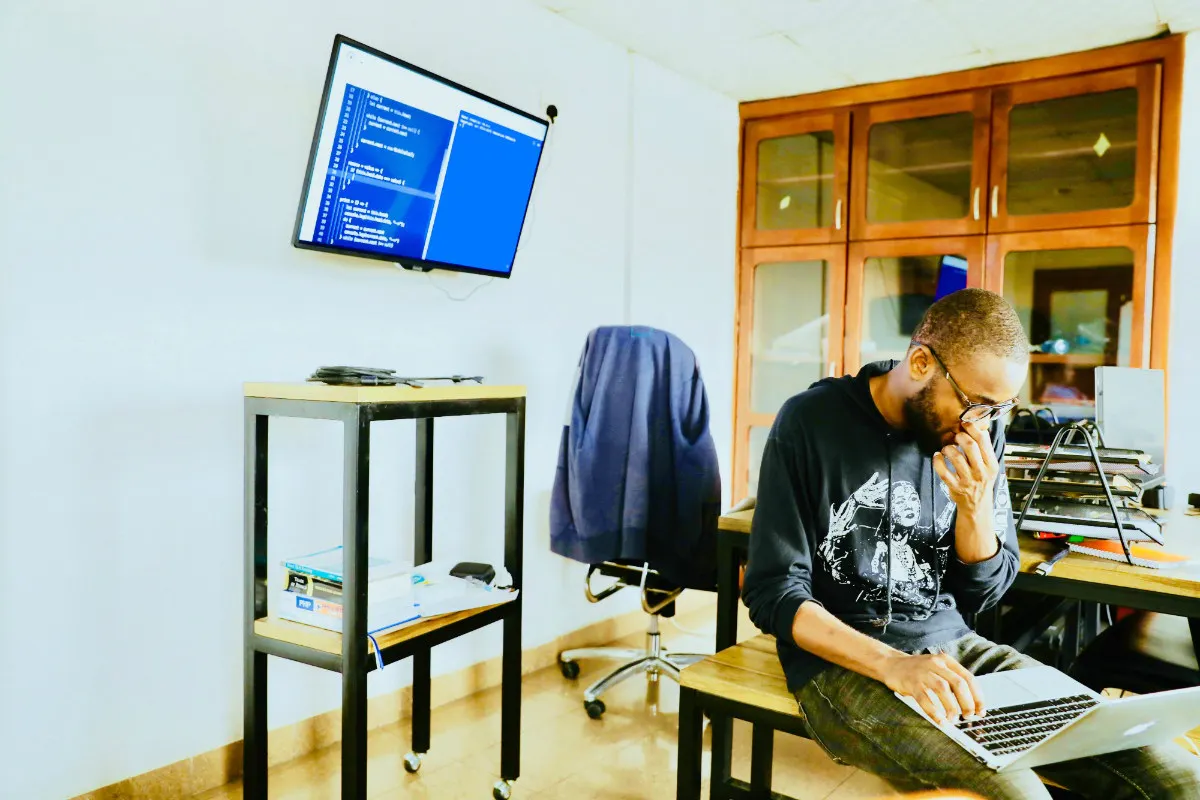Fill out the form to get more information about the Fullstack Academy bootcamp of your choice.
08.31.2023
Coding While Black: Black Tech Professionals Share Their Experiences
By The Fullstack Academy Team

“Until my tenure at Twitter, I strongly resisted being ‘the Black guy,’” writes Mark S. Luckie, an author, digital strategist, and former Twitter employee. “I didn’t want to be the sole representative of a multifaceted group of people or be siloed into focusing on Black issues.”
That perspective makes total sense. Wouldn’t you feel uncomfortable if everyone in the office expected you to speak for millions of other individuals for no other reason than that you were seen to share the same skin color, and by extension the same cultural values, life experience, and way of thinking?
On the other hand, in an industry where even some of the biggest employers have only two Black programmers for every 100 hired, who else is equipped to speak to the Black experience and thus to give Black product users a voice? At least that’s how Luckie himself came to see things once the Black Lives Matter movement got underway: “I realized that I and other Black employees could be the voice for a community of users who had been largely ignored or misunderstood by social media companies.”
It can be an isolating, exhausting experience for a Black programmer to feel responsible to an entire race of people, in a career and an industry that’s already challenging enough, considering the technical requirements, the notoriously long work hours, and the sometimes toxic work environments.
We’ve talked before about the leaders, organizations and advocacy groups advocating for Black representation in tech and working every day to make the same opportunities accessible to Black Americans that are available to white Americans. In this piece, we’ll focus on the unique challenges and opportunities facing individual Black software developers as they navigate their tech careers, and we’ll celebrate the accomplishments of those paving the way for others.
Since Luckie’s realization, he’s published a novel, Do U, that explores the experiences of Black people in America through the story of three college students. He’s also become a leading voice in demanding that tech companies do a better job of hiring and including people of color.
“Tech companies must reflect the communities they serve,” he writes. “If not, they risk alienating the users most responsible for their success.”
Exclusion of Black Professionals Is a Big Problem in Tech
Tech—and Silicon Valley in particular—remains overwhelmingly white. According to research by The Center for Investigative Reporting, Black employees make up only 2.5 percent (median) of Silicon Valley employees. Compare that with the number white people, who make up 57 percent (median) of Silicon Valley employees.
That means that at most companies, there are nearly 23 times as many white people as Black people. In fact, at only one of the 177 companies surveyed did Black employees make up more than 20 percent of the total workforce—and that company has chosen to remain anonymous.
And a study by the U.S. Equal Employment Opportunity Commission found that the tech sector employs a much smaller percentage of Black people (7.4 percent) than does the rest of the private sector (14.4 percent).
Danielle Brown and Barbara Whye, the former chief diversity and inclusion officer at Intel and the current chief diversity and inclusion officer at Intel, respectively, point out that representation figures have improved by only one or two percentage points in 15 years’ time. To compound the injustice, a study by Hired, based on information gathered by data scientist Dr. Jessica Kirkpatrick, reports that Black software engineers are likely to be paid an average of $10,000 less than their white counterparts.
Although the precise degree to which Black employees are underrepresented in tech varies from source to source, the bottom line is this: Black people are not fairly represented in tech, and minimal efforts to change that reality have—not surprisingly—brought about no significant change.

What’s Life Like for Black Developers? Ask Them
Feeling Undermined by the Culture of Exclusion at Work
Obama Foundation CTO Leslie Miley had mixed feelings about his time as an engineering manager at Twitter. While he was grateful for the opportunity to contribute to a platform that can positively impact the lives of Black Americans, Miley says several experiences left him questioning Twitter’s stance on diversity.
First, he noticed he was the only person advocating for diverse candidates during the interview process. The next red flag was when Twitter failed to invite Twitter Blackbirds, the Black employee resource group, to events that prominently featured Black leaders like former Head of the NAACP Ben Jealous and the Reverend Jesse Jackson.
Miley details how he worked tirelessly to make Twitter’s recruiting efforts and company culture more inclusive of people of color, but ultimately he left when he realized the views of the company’s senior leaders didn’t align with his own.
Always Being the Only One
The one constant for iOS engineer Kaya Thomas has been that no matter the employer, she never finds another Black woman—or even a Black man—on her engineering team. And Thomas wonders whether that limits her ability to be her authentic self.
“For example, if something tragic happens — a lot of tragic things have been happening in America — and someone is killed by the police in another community, can I go to work and talk about that?” she asked in an interview with DreamHost. “Especially if I’m the only black engineer, will my team get it, will they empathize, will they understand? That’s really hard.”
Thomas goes on to say that in her experience as a person of color in tech, “there’s a sense of hyper-visibility and hyper invisibility. There’s hyper-visibility in the sense that you’re seen as that black person who works on the team or that Latino person who works on the team — it’s very obvious that you’re the only. But then there’s hyper invisibility. The microaggressions and other things you might face in the workplace are invisible to everyone else.”
Imposter Syndrome, Lack of Trust—Is It Worth It?
Software engineer Jada Monique says she will never be able to feel comfortable in a room where no one looks like her. She regularly questions the motives of company decision-makers: Was she passed over for an opportunity because she didn’t have the requisite experience—or simply because of her race or gender? There’s no way for her to know for sure.
And she feels a keen responsibility never to make mistakes. On the one hand, that’s because she wants to serve as a role model for other Black women. On the other, it’s because she feels that any time she makes a mistake, she is jeopardizing not only her own chances of moving up at her company, but also the chance that next Black woman will even get as far as she has. And studies on imposter syndrome bear out her concerns: Women in the workplace, for example, are often punished more harshly for mistakes than men, while men’s mistakes don’t incur the same consequences.
Yet Monique says getting the chance to prove herself outweighs those challenges. “In my opinion, black women are often given the short end of the stick. There’s not many of us in the tech world. So being able to show that we can create great things impresses people.”
For Some, the Problem Lies Outside of Work
/dev/color founder Makinde Adeagbo says race has not impacted his career. “I haven't felt like my ideas or viewpoints were looked down upon because of my race,” he writes. “Yes, I've had an interviewer ask me why the Black kids sit at the same table. Yes, I've had a coworker ask me if Black people really are as smart as Asians. While these cases were disturbing, they don't define my experience.”
He admits, though, that life can be a little harder outside the office. In Palo Alto or Menlo Park, Black people make up less than 5 percent of the population (again, compare that with white people, who make up 60 to 70 percent—a 12- to 14-fold majority). Adeagbo says the implications this has for dating and social activities might make it harder for some Black professionals to leave a city like Atlanta or Washington, D.C., where Black Americans make up about 50 percent of the population, for tech jobs in much whiter the Bay Area.

How to Cope with Alienation as a Black Tech Employee
Though being a Black programmer can undoubtedly feel isolating, there are a number of affinity groups offering support and community.
Take /dev/color, mentioned above, a nonprofit networking organization for Black developers. In their community, knowledge, resources, experiences, and connections are shared to further members’ career goals.
There’s also Blacks in Technology, another network of Black tech workers, this one with seven local chapters across the country. The organization offers events, activities, resources, and guidance for members.
Black tech entrepreneur Wayne Sutton has co-founded two organizations with these same community and career goals. Tech Inclusion is a global, multi-event program of conferences, startup showcases, and career fairs, while #BlackMenInTech is a membership community that connects founders, investors, engineers, and designers through meetups and events.
Finally, Black tech entrepreneurs can find support from Black Founders. This organization has created an ecosystem that provides Black entrepreneurs with access to advice, mentorship, and funding. The organization also runs a hackathon and an annual event, the Ideas Are Worthless Conference.
For a more comprehensive list of organizations supporting Black coders, click here.
Where Do We Go from Here?
The experiences mentioned here only skim the surface of what life is like for Black developers. But it’s important to share stories like these for a few reasons:
- To generate broader awareness of the issues Black people face within the tech industry
- To drive more inclusive hiring strategies at tech companies
- To give Black Americans interested in tech insights into what the industry is really like
And representation matters. Amplifying the stories of Black professionals inspires other young Black coders to pursue coding, if that’s what they’re passionate about.
A few companies have pioneered successful initiatives to close the gender gap, and some of the ideas that underpin those initiatives could yield equally successful programs for recruiting and nourishing Black talent. The affinity groups mentioned above are doing great work—but the burden shouldn’t be solely on Black tech professionals to make space for themselves. How can the systems perpetuating the problem make opportunities available to Black Americans as often as they do to white Americans?
The Case for Regulation
Developer jobs are lucrative and generally stable, so they could help close the wage gap between Black Americans and white Americans—but only if the predominantly white industry is forced to open up to more Black developers. While the industry should do this on its own, we’ve seen time and again that most industries do not regulate themselves.
The financial sector must be regulated by the SEC, and even then can still tank the economy. Oil and agriculture companies must be regulated by the EPA—and we’re already seeing the dangerous effects of policy rollbacks.
Tech is no different. Until this predominantly white male industry is regulated by an outside agency, we won’t see a significant number of Black individuals benefiting from tech salaries any time soon. And that’s shameful.
Diverse Teams by the Numbers
What’s more, it’s bad for business. In a 2017 study, the Boston Consulting Group found that companies with diverse management teams report 19 percent higher “innovation revenue” (revenue generated by products launched in the preceding three years) than those without.
With Black tech professionals making up so little of today’s tech ecosystem, we’re all missing out on better ideas, more innovative technology, and a totally different world. Most of all, we’re missing out on a chance to make this industry more equitable—not just because it’s profitable, but because it’s the right thing to do.
Coding Bootcamps Can Help
Coding bootcamps are one way Black Americans can get access to tech jobs. They afford students skills training, career coaching, and professional networks that many Black people are traditionally locked out of.
O'Reilly Media software engineer and Google Scholar Nnenna Ndukwe went from tanning salon employee to her current position in less than two years. Having taught herself the basics of coding through online courses and having networked with people in the field via local meetups, Ndukwe was ready for the next step. She enrolled in a coding bootcamp to learn the real-life skills she needed to land her first job as a developer.
Front-end developer Joe Warren also found his way into the tech world by enrolling in a coding bootcamp. Warren started 2017 with the #100DaysOfCode challenge and ended with a 13-week immersive bootcamp. By March 2018, he had landed a web development internship, and by August he had a full-time mid-level software engineering position at USAA.
See if a coding bootcamp is the right way for you to join the industry. With Fullstack Academy’s Bootcamp Prep courses, you’ll learn what you need to get into bootcamp—and you’ll do it in a welcoming and inclusive learning environment. The best part is, there’s absolutely no risk: You’re guaranteed to get your money back when you finish. Sign up for Bootcamp Prep today.


